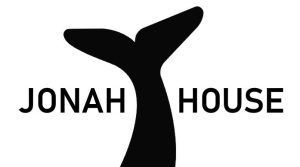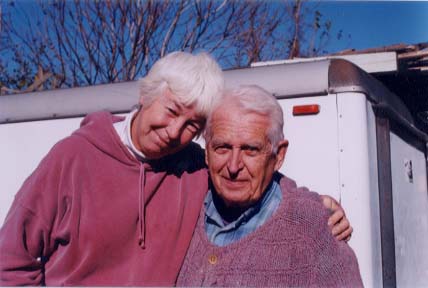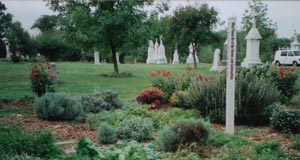Jonah House began as a community in 1973 with a group of people that included Philip Berrigan, a Catholic priest, and Elizabeth McAlister, formerly a Catholic nun. The community later called itself Jonah House.
With the name, meanings accrued. If God could use Jonah for the works of justice, there is hope for each of us. Are we not all reluctant prophets?
From its inception, the community included religious and lay people, married and single people, children and adults, younger and older people.
The community lived in a row-house in west Baltimore for 23 years, and moved to St. Peter’s Cemetery in 1996. The community lives in the 22-acre cemetery and cares for the grounds. The community maintains a vegetable garden and dozens of fruit trees, berry bushes, flowers and ornamentals, as well as an eight-acre forest patch.
Almost two-thirds of the cemetery has been cleared; the rest is woods overgrown with vines. In time, we hope to deal with poison ivy and other invasive plants.
Over the years, there have been many animals joining the humans at St. Peter’s Cemetery, including goats, guinea fowl (they eat ticks and mosquitoes), llamas, donkeys, cats, and dogs.
NONVIOLENCE
People at Jonah House are committed to making nonviolence a way of life. We agree that “Thou shalt not kill” has no exceptions: we believe that we are commanded by our faith not to kill and, beyond that, to resist killing in our name. More – we know that nonviolence involves the utmost respect for each other, for all people (individually and collectively), and for all creation.
RESISTANCE
Resistance implies actions in opposition to unjust practices, policies, institutions and systems. As a community, we commit to speaking out about the connection between warmaking and homelessness, hunger, despair and poverty. The particular focus of Jonah House has been engaging in nonviolent civil resistance against war and for the abolition of all weapons of mass destruction.
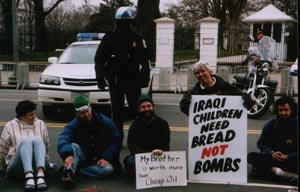
COMMUNITY
We learned slowly and are still learning that community is vital to our nonviolence and resistance. The essence of community for us is breathing together on behalf of life (which is the meaning of conspiracy). The Jonah House Community shares a common purse and consistent resists the hierarchies and exchange values of the dominant culture. Decisions are made together. Work is shared in all its aspects. Study, prayer, writing, teaching and manual labor are all important components of our life.
FAITH
Jonah House is a faith-based community. While the majority of people at Jonah House have been Catholic with an emphasis on the anti-war social justice teachings of the Church, people of all faiths are welcome. We pray together each weekday at 7 a.m. and host a house church on Sundays at 10 a.m. that features scripture study and table fellowship, followed by brunch.
People at Jonah House are encouraged to take time each day in personal prayer; some pray while they work; others set aside a specific period of time for prayer. There are no hard and fast rules.
PLOWSHARES
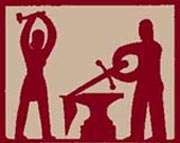 Plowshares actions take their name from Isaiah 2:4: “They shall beat swords into plowshares and their spears into pruning hooks; nation shall not lift up sword against nation, nor shall they learn war any more.”
Plowshares actions take their name from Isaiah 2:4: “They shall beat swords into plowshares and their spears into pruning hooks; nation shall not lift up sword against nation, nor shall they learn war any more.”
The first plowshares action was September 1980 at the General Electric plant in King of Prussia, PA. Eight people, including Philip Berrigan, hammered and poured their blood on the Mark 12A nuclear missile components. Since then there have been over a hundred plowshares actions which have included many people from Jonah House. Each action community, grounded in prayer, seeks to disarm a weapon or delivery system for a nuclear weapon or weapon of mass destruction.
FOOD JUSTICE
Prior to the Pandemic, about 125 people from the neighborhood came weekly to Jonah House to pick up boxes of food. Food was gathered from our garden (in season) and from the local food bank. Each person who came has a story that reveals more of the injustice system, reminding us of the ways the military budget should be spent – for homes, jobs, education, food, clothing and health care.
Today, the Jonah House Community Garden continues with a small group of committed folks of Jonah House residents, Friends of Jonah House, and residents of the larger neighborhood. With more hands, the food justice initiatives and possibilities of the garden are many.
GRATITUDE
Members of the present community are deeply grateful to all who built the community and the house in which it resides, to all who sustain the community with their work and joys, their tears and sufferings, to all who were ever part of Jonah House as well as all who support us in any way including those who have been and are engaged in resistance to the empire and its violence, and all who are part of the liturgy circle.
